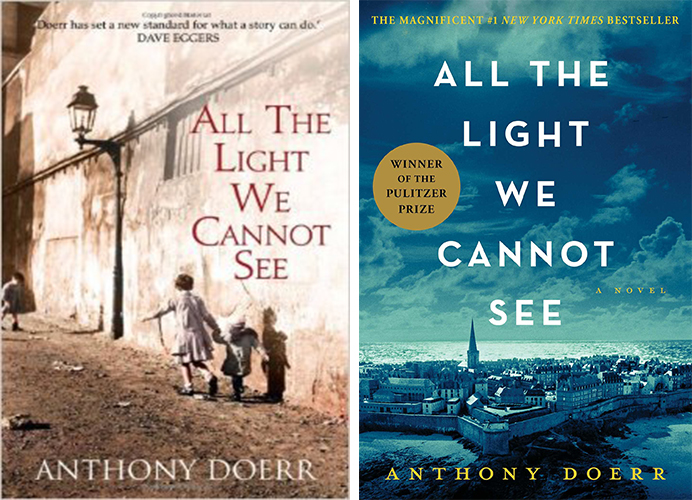
Oh. I see now why this book was the talk of the town this last year. I see now why it won the Pulitzer. Anthony Doerr deserved it.
All the Light We Cannot See by Anthony Doerr is a book that I will carry with me for years, if not the rest of my life. Not only is his prose as lyrical as poetry, but the topics he touches on through the lives of his main character – just children at the time of the novel – are some of the deepest, most important topics we can tackle as writers.
Through the lives of Werner, a young German orphan destined to be yet another pawn in Hitler’s war, and Marie-Laure, a young French girl who happens to be both extremely bright and completely blind, Doerr tackles the effects of loss, love, belonging, and resistance. Their two stories grow closer and closer as the novel spirals toward the end, and the moment they meet is met with a full exhale, as if you have (I actually think I was) holding your breath for the previous 450 pages.
Favorite Quotes:
(Apologies there are no page numbers. Reading on a Kindle has many drawbacks, but being able to copy and paste my highlights is not one of them. Also, there are a lot of them.)
“We are Malouins first, say the people of Saint-Malo. Bretons next. French if there’s anything left over.”
“It’s steel country, anthracite country, a place full of holes.”
“A color that is the absence of color.”
“To really touch something, she is learning–the bark of a sycamore tree in the gardens; a pinned stag beetle in the Department of Etymology; the exquisitely polished interior of a scallop shell–is to love it.”
“She has no memories of her mother but imagines her as white, a soundless brilliance. Her father radiates a thousand colors, opal, strawberry red, deep russet, wild green… he is an olive green when he talks to a department head, an escalating series of oranges when he speaks to Mademoiselle Fleury from the greenhouses, a bright red when he tries to cook. He glows sapphire when he sits over his workbench in the evenings, humming almost inaudibly as he works, the top of his cigarette a prismatic blue.”
“She finds the ribbon she uses as a bookmark, opens the book, and the museum falls away.”
“Stones are just stones and rain is just rain and misfortune is just bad luck. Some things are simply more rare than others, and that’s why there are locks.”
“Only the strongest people can turn away from feelings like that.”
“Everything is glory and country and competition and sacrifice.”
“The war drops its question mark. Memos are distributed.”
“Marie-Laure can hear a can opening, juice slopping into a bowl. Seconds later, she’s eating wedges of wet sunlight.”
“Music spirals out of the radios, and it is splendid to drowse on the davenport, to be warm and fed, to feel the sentences hoist her up and carry her somewhere else.”
“Why else do any of this if not to become who we want to be?”
“She did not imagine it properly; she did not comprehend the scale.”
“How do they know what part to play, those little bees?”
“Car after care the prisoners come, a river of human beings pouring out of the night.”
“She stands alone in Madame Manec’s room and smells peppermint, candle wax, six decades of loyalty.”
“We will drive over everything that once was.”
“Time is a slippery thing: lose hold of it once, and its string might sail out of your hands forever.”
“It’s embarrassingly plain how inadequate language is. A town of the northern coast of France? Love? Nothing will be healed in this kitchen. Some griefs can never be put right.”
What made this a good story?
Everything about it. If you can read those quotes above and not want to read this story, I don’t think we can be friends.
But seriously, this story was equal parts heart-warming and heart-wrenching. There are moments when Doerr’s words sing from the page, and every moment moves the story closer and more inevitably toward a dramatic finish.
But that doesn’t mean I still don’t have some questions.
*
*
*
*SPOILERS FROM NOW ON*
Stop reading now if you don’t want to ruin the end!
*
*
*
I’m entirely happy with the ending. Mostly, because the ending isn’t happy.
Would Werner every be able to love anyone as much as he loved learning? He left his sister Jutta for it – would he have left Marie-Laure as well? Would she have been enough for him, without the thrill of the radio hunt?
Why did Werner have to die?
Marie-Laure lived a decent life, not a good one. Did Jutta? Did Volkheimer? Does war destroy the possibility for people to live good lives? Or are they constantly haunted by the people and the past left behind? Can they ever lead really good lives again after what they have been through?
I don’t know the answers to these questions. But I think Doerr’s novel requires us to think about them nonetheless, to examine the cost of war not just on countries and economies as a whole – which is what we tend to learn about in our history classes – but on the lives of the individuals that are living through it. Especially the children.
In a perfect world, this book wouldn’t have this ending. As I swiped to the last page on my iPad, I was in shock and immediately declared that I would have ended it differently. But now that I’ve got some distance between then and now, maybe I wouldn’t have.
Have you read All the Light We Cannot See? If so, what did you think? And what alternate ending would you have created?

Leave a Reply